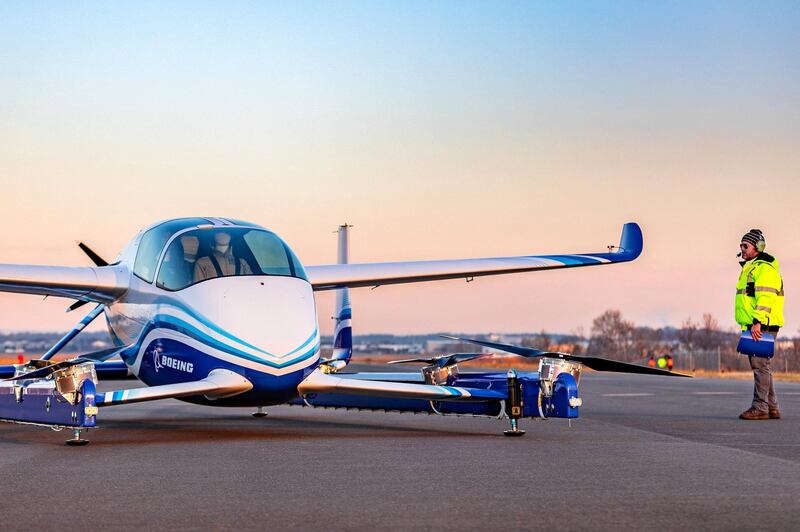A Boeing flying car designed to whisk passengers over congested city streets and dodge skyscrapers completed its first test flight on Tuesday, offering a peek into the future of urban transportation that the aerospace giant and others are seeking to reshape.
A prototype of its autonomous passenger air-vehicle completed a controlled takeoff, hover and landing during the test conducted in Virginia, US, the maker of military and commercial jets said on Wednesday. Propelled by electricity, the model is designed for fully autonomous flight, with a range of as much as 80km, Boeing said.
Boeing’s push was boosted by a 2017 acquisition of Aurora Flight Sciences, whose projects include a new flying taxi it is developing with Uber Technologies.
The Chicago plane maker and rival Airbus are among a slew of companies racing to stake a claim on flying cars and parcel-hauling drones, according to Bloomberg, which have the potential to be the next disruption to sweep the aerospace industry.
In September The National reported that the founder of one of Britain's national energy suppliers intends it to offer inter-city flying taxi services that takeoff and land vertically within the next four years.
_______________
Read more:
[ Aston Martin's Volante gives flying cars a luxurious twist ]
[ Japan enlists Airbus and Saudi-backed Uber in flying-car plan ]
_______________
Vertical Aerospace, led by chief executive Stephen Fitzpatrick, and with ex-Airbus and Boeing engineers on staff, late last year completed its first successful test flight of an unmanned prototype vehicle.
"We’ve focused on the market of short distance travel between cities," he said at the time. "We expect our piloted vehicles will take people from one city to the next by leaving closer to people’s homes, not necessarily at airports.
Others are also rushing rotorcraft concepts to market. Vahana, the self-piloting air taxi developed by A3, Airbus’s tech-centric Silicon Valley outpost, completed its first test flight last year. Intel and EHang are also testing their flying vehicles.
Morgan Stanley analysts, in their most bullish estimates, predict such technology could lead to a $2.9 trillion industry by 2040, while their most pessimistic view pegs the value at about $615 billion.
Boeing’s urban air mobility arm, Boeing NeXt, enlisted Aurora to design and develop the prototype. The company did not say if the model is the one being developed for Uber. Boeing NeXt’s portfolio also includes a fully electric cargo air vehicle designed to transport as much as 227kg, which completed its first indoor flight last year and is slated for outdoor testing this year.
Future flights of the 30-feet long and 28-feet wide PAV prototype will test forward, wing-borne flight and the transition phase between vertical and forward-flight modes, according to Boeing. The company will also continue testing to advance safety and reliability of the aircraft, it said.






